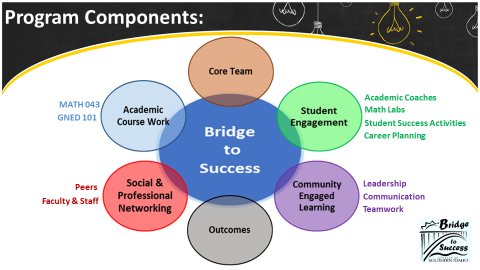As we began looking at ways CSI might engage more high school students to consider going to college, either in a CTE program or a transfer program, we considered populations that normally do not go on. The Bridge to Success Program was a highly successful pilot program, and CSI will be asking for ongoing funding from the state to institutionalize it. As other community colleges begin looking at ways to improve recruitment and retention, programs like this might be beneficial.
Dr. Jeff Fox, President at College of Southern Idaho
Bridge to Success Summer Bridge Program
Program Description:
- The Bridge to Success summer bridge program is an intensive ten-week program that provides first time, degree-seeking, at-risk students a head start in their transition to CSI. The program introduces students to the academic expectations of CSI, specifically for degrees that require challenging first-semester course work in math. Moreover, the program develops 21st century skills that are essential in the classroom and in the workplace, promotes community engaged learning, familiarizes students to valuable campus resources to increase student success, and fosters social and academic relationships with peers, faculty, and staff.

Program Components:
- Core Team
- Academic Coursework
- Math 043
- GNED 101
- Social &Professional Networking
- Learning Communities
- Peers
- Faculty & Staff
- Student Engagement
- Academic Coaches
- Math Labs
- Student Success Activities
- Career Planning
- Community Engaged Learning
- Leadership
- Communication
- Teamwork
- Outcomes
- Learning Communities
Lesson Learned:
- Many of today’s community college students (particularly first generation) fall outside of the traditional education model. Not all students learn at the same pace, particularly in math. The ability to extend course end dates, to adjust the mode of delivery within the course, and to “flex” the math level (up, down, or across) is critical to student success.
- When students leave campus, many go to work; others engage in family duties. Structuring block schedules and providing supplemental math labs where students can complete homework and have access to tutoring while they are on campus is essential.
- When students feel support from peers and instructors, they gain confidence in their ability to be successful. Utilizing learning communities that link courses, incorporate community engaged learning, and offer student success activities provides students with opportunities for social and professional networking, mentoring, advising, leadership training, job shadowing, and more.